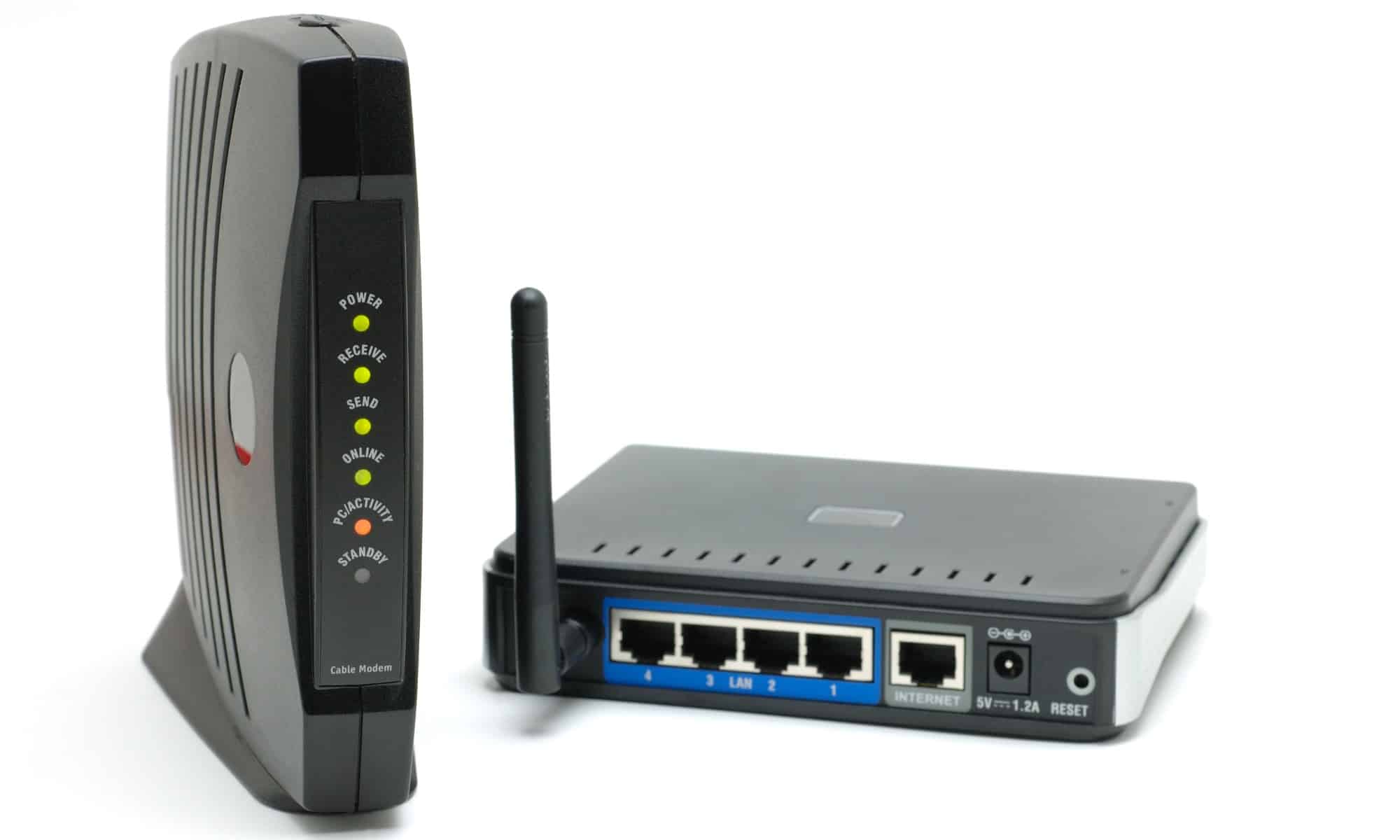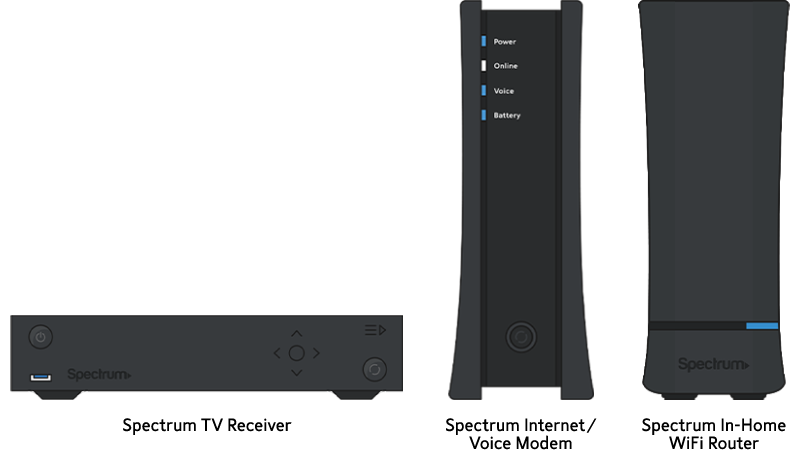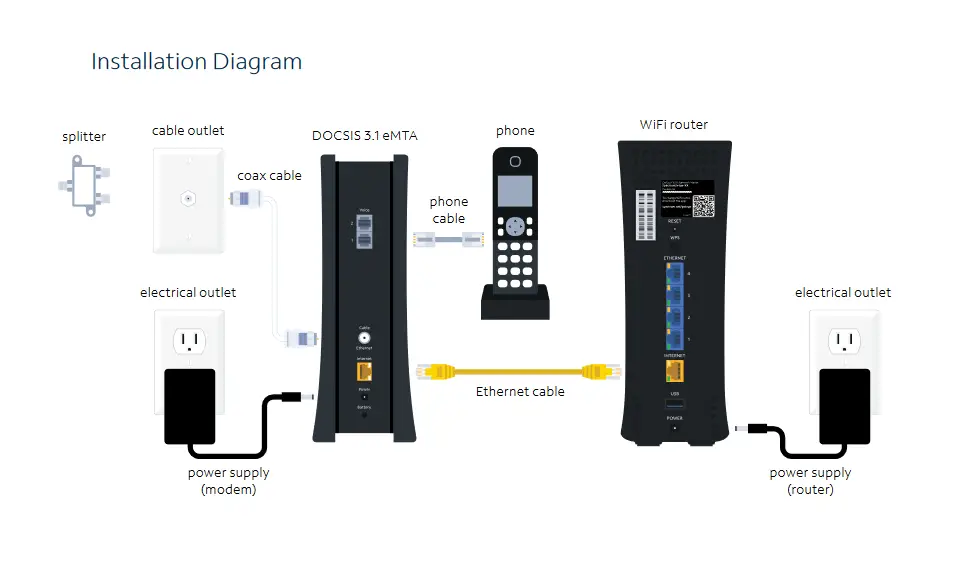A modem establishes an internet connection, while a router broadcasts a WiFi signal for multiple devices to connect wirelessly. A modem is a device that establishes an internet connection in your home, while a router broadcasts a WiFi signal that allows devices to connect to the internet wirelessly.
Many people wonder about the difference between a modem and a router and when each device is necessary. If you only have one device that needs to connect to the internet, such as a PC or laptop, you can get away with just having a modem.
However, if you have multiple devices or want to connect them wirelessly, you will need a router. We will explore the differences between routers and modems in more detail and discuss when each device is necessary.
Understanding The Basics
Understand the difference between a router and modem in Spectrum internet. A modem connects your home to the internet, while a router broadcasts a WiFi signal for multiple devices to connect wirelessly. Make sure you have both if you want to use multiple devices or connect wirelessly.
What Is A Modem?
A modem is a crucial device that establishes an internet connection in your home. It serves as a bridge between your home network and your Internet Service Provider (ISP). Essentially, it allows your computer or other devices to access the internet using a wired connection.
What Is A Router?
On the other hand, a router broadcasts a WiFi signal, enabling devices like laptops, smartphones, and tablets to connect to the internet wirelessly. It acts as a central hub that allows multiple devices to share the internet connection simultaneously.
Do I Need Both A Router And A Modem?
If you have only one device that needs internet access, such as a PC or laptop, you can get away with just having a modem. However, if you have multiple devices in your household or you want to use them wirelessly, a router is essential.
A router is especially important if you want to enjoy the convenience of WiFi connectivity. With a router, you can connect your smartphones, tablets, and smart home devices without the hassle of additional wires and cables.
Signs That You Might Need A New Modem Or Router
While both modems and routers are built to last, there may come a time when you need to upgrade or replace them. Here are some signs that indicate you might need a new modem or router:
- Slow internet connection: If your internet speeds are consistently slower than what you’re paying for, it could be a sign that your modem or router is no longer able to keep up with the demands of your devices.
- Router age: Technology is constantly evolving, and newer routers offer faster WiFi speeds and better security. If your router is outdated, it might be time for an upgrade.
- Router running hot: Overheating can lead to performance issues or even hardware failure. If your router feels hot to the touch, it’s a good idea to consider getting a new one.
- Unreliable connectivity: If you frequently experience drops in your internet connection or have trouble staying connected, it could be a sign of a faulty modem or router.
- Rented equipment: If you’re still using a modem or router provided by your ISP, you might want to consider purchasing your own. Rented equipment can be outdated or limited in functionality.
In conclusion, while a modem and a router are distinct devices with different functions, they are both essential for a reliable and convenient internet connection. Understanding the basics of their roles can help you make informed decisions about your home network setup.
Functionality And Purpose
The functionality and purpose of a modem and a router are essential components for establishing and managing an internet connection in your home or office. Each device plays a distinct role in ensuring a seamless and efficient internet experience. Understanding the differences between these two devices is crucial for optimizing your internet connection and meeting your specific needs.
Modem Functionality
A modem serves as a bridge between your home or office network and your internet service provider (ISP). It is responsible for establishing and maintaining a wired internet connection by converting the digital data from your ISP into a format that your devices can understand. The modem allows you to connect a single device, such as a PC or laptop, directly to the internet.
A modem’s primary function is to provide internet connectivity, but it does not have the capability to distribute the internet connection among multiple devices or enable wireless connectivity. It is essential to have a modem if you want to access the internet on at least one device.
Router Functionality
A router, on the other hand, is responsible for distributing the internet connection provided by the modem to multiple devices in your home or office. It acts as a central hub that enables wired and wireless connectivity and allows devices like laptops, smartphones, and tablets to connect to the internet.
Unlike a modem, a router provides network security features such as firewalls and access controls, allowing you to protect your devices and data from unauthorized access. Additionally, routers come with advanced features like Quality of Service (QoS), which prioritizes internet traffic for better performance, and parental controls for managing internet access for children.
Having a router is essential if you have multiple devices or if you want to enjoy wireless internet connectivity (WiFi) throughout your home or office.
In conclusion, while a modem is responsible for establishing a wired internet connection, a router’s role is to distribute the internet connection to multiple devices and provide additional network features. Both devices serve different functions but work together to ensure a seamless and efficient internet experience.
Do I Need Both?
Do I Need Both?
If you only have one device that needs to connect to the Internet, such as a PC or laptop, you can get away with merely having a modem. However, if you have many devices or wish to use them wirelessly (WiFi), you’ll need a router. So, whether you need both a modem and a router depends on your usage requirements.
Single Device Usage
If you have a single device that needs to connect to the Internet, a modem is sufficient. A modem is a device that establishes an internet connection in your home. It acts as a bridge between your internet service provider and your device, allowing you to access the internet through a wired connection.
Multiple Devices Or Wifi Usage
If you have multiple devices or want to use them wirelessly, a router is necessary. A router broadcasts a WiFi signal that allows devices like laptops, smartphones, or tablets to connect to the internet wirelessly. It also enables all of your wired and wireless devices to use the internet connection at once and allows them to communicate with one another directly.

Credit: history-computer.com
Distinguishing Features
When it comes to understanding the difference between a router and a modem in Spectrum internet, it is essential to recognize their distinguishing features. Although both devices play a crucial role in providing internet connectivity, they have separate functionalities and appearances.
Physical Appearance
A router and a modem can be easily distinguished based on their physical appearance. A modem generally looks like a small box, specifically designed to establish an internet connection. It is usually provided by your internet service provider (ISP) and connects to a coaxial or DSL line. On the other hand, a router is slightly larger, often resembling a square or rectangular shape. It is responsible for broadcasting a WiFi signal and enabling multiple devices to connect to the internet wirelessly.
Ports And Connections
The ports and connections on a router and a modem also differ from each other. A modem typically has a single Ethernet port, which connects to your computer or other devices using an Ethernet cable. In contrast, a router has multiple Ethernet ports to support wired connections. Additionally, routers also feature WiFi antennas, allowing wireless connections to devices such as laptops, smartphones, and tablets.
Here is a comparison between router and modem in terms of their distinguishing features:
| Feature | Modem | Router |
|---|---|---|
| Physical Appearance | Small box | Rectangular shape |
| Ports and Connections | Single Ethernet port | Multiple Ethernet ports and WiFi antennas |
It is important to understand the differences between a router and a modem in Spectrum to make informed decisions about your internet connectivity needs. By recognizing the unique features of these devices, you can optimize your home network for seamless online experiences.
Spectrum’s Approach
Spectrum’s approach to explaining the difference between a router and a modem is simple and straightforward. A modem is the device that provides a wired internet connection to your home, while a router broadcasts a WiFi signal that allows multiple devices to connect wirelessly.
So, if you have multiple devices or want to use them wirelessly, you’ll need both a modem and a router.
Reasons For Providing Both
One of the reasons why Spectrum provides both a router and a modem is to cater to the different needs of its customers. While a modem is responsible for establishing an internet connection in your home, a router is essential for broadcasting a WiFi signal that allows devices like laptops, smartphones, and tablets to connect to the internet wirelessly. By providing both devices, Spectrum ensures that customers can have a seamless and reliable internet experience, whether they have a single device or multiple devices that need to be connected.
Advantages And Disadvantages
There are several advantages to having both a router and a modem from Spectrum. Firstly, having a router allows you to connect multiple devices to the internet wirelessly, providing convenience and flexibility. It enables you to use your devices in any part of your home without the need for wired connections. Additionally, a router can offer advanced features such as better security settings and parental controls, giving you more control over your internet usage.
However, there are a few disadvantages to consider as well. The cost of purchasing both a router and a modem can be higher compared to having just one of these devices. Additionally, setting up and configuring both devices may require a bit of technical knowledge, which could be a challenge for some users. Despite these drawbacks, the benefits of having both a router and a modem from Spectrum often outweigh the disadvantages, especially for those who have multiple devices or need a WiFi connection.

Credit: www.spectrum.net

Credit: www.spectrum.com
Frequently Asked Questions For Difference Between Router And Modem Spectrum
Do I Need Both A Router And A Modem?
You only need a router and a modem if you have multiple devices or want to use them wirelessly. A modem establishes an internet connection, while a router broadcasts WiFi signals for devices to connect wirelessly.
Which Is My Modem And Which Is My Router Spectrum?
A modem establishes an internet connection in your home, while a router broadcasts a WiFi signal for devices to connect wirelessly.
How Do I Know If I Need A New Modem Or Router?
A modem establishes an internet connection in your home, while a router broadcasts a WiFi signal for devices to connect wirelessly. If you only have one device, like a PC or laptop, you can get by with just a modem.
But if you have multiple devices or want WiFi, you’ll need a router.
Which Is My Router And Which Is My Modem?
A modem connects your home network to your internet service provider, while a router allows all your devices to use that internet connection and communicate with each other.
Conclusion
To sum up, the main difference between a router and a modem is their function. A modem establishes the internet connection in your home, while a router broadcasts the WiFi signal, allowing devices to connect wirelessly. If you only have one device, a modem is sufficient.
However, if you have multiple devices or need WiFi, a router is necessary. Understanding the distinction between the two will help you make informed decisions about your internet setup.

